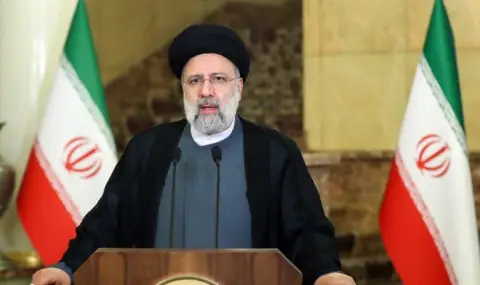Ebrahim Raisi was both Iran's president and a candidate to succeed him of the outdated de facto ruler of the country, Supreme Leader Ali Khamenei.
According to Time magazine, both policy positions carry a heightened level of risk roughly comparable to the risk of air travel in Iran, where aviation safety undermined by decades of sanctions and patchy maintenance has claimed the lives of such high-ranking Iranian officials as a proxy war with Israel, which also hung over Raisi's death.
"The cause of the crash is still under investigation. But any official conclusion will be open to interpretation, just like the fireworks that exploded in the streets of Tehran on Sunday night: were they celebrating on the eve of the holiday marking the birth of Reza, known as the 8th Imam? Or the death of Raisi, a notoriously strong president?“, the material says.
The incident came two months after Iran launched a massive missile and drone attack on Israel in response to an airstrike that killed two senior Iranian generals in Syria on April 1. Israel's initial response to the unprecedented direct attack on its territory was so muted as to be symbolic: the target was an anti-aircraft battery guarding a nuclear site.
For those inclined to believe that the helicopter crash was a strike caused by Tel Aviv, the location of the accident is telling. Raisi's helicopter went down in a mountainous forest near the border with Azerbaijan, the least friendly of Iran's neighbors - in part because it maintains relations with Israel and cooperates with the Mossad.
Weather can also be a factor. Iranian authorities said efforts to locate the crash site were hampered by fog, wind and heavy rain.
Finally, there is the internal politics of the Islamic Republic, known for being brutal at the best of times, and even more so now, given persistent rumors that Khamenei, who ruled for 35 years, is ill.
"Raisi's death will lead to a succession crisis in Iran,” Karim Sajapour, a senior fellow at the Carnegie Endowment for International Peace, told TIME on Sunday as state television anchors donned black robes.
"Raisi and Mojtaba Khamenei, the son of the 85-year-old supreme leader, are the only candidates being discussed to succeed him. In Iran's conspiratorial political culture, few would believe that Raisi's death was an accident,” says Sajapour.
Raisi, 63, thrives in this conspiratorial culture. The name of his political faction, the Association of Militant Clergy, hints at his place in the authoritarian theocratic system that replaced the monarchy that ruled Iran for most of the 20th century until 1979.
Raisi made a career in the security sector, serving as a prosecutor in various provinces and demonstrating a firm demeanor. In the late 1980s, he was part of a "death committee" which human rights groups say ordered the summary execution of thousands of political prisoners.
The executions upset the succession plan of Grand Ayatollah Ruhollah Khomeini, the Shiite cleric who led the 1979 revolution, after his own outraged protégé declared: "I said I would follow you everywhere, but I will not follow you to hell.< br />
Instead, Khamenei, with a similar name, took office and was quickly given the title of Ayatollah. In the decades that followed, Raisi also rose to head the judiciary, which reported directly to the leader.
However, Raisi had no obvious political supporters beyond regime loyalists, who make up about 20 percent of Iran's 88 million people. His election as president in 2021, amid record low voter turnout and allegations of fraud, was seen by observers as a signal that the "system”, as Iranians call the ruling apparatus, no longer views elected office as necessary leverage to pressure Iranian society, which is angered by the joint rule of hard-line clerics and the Islamic Revolutionary Guard Corps (IRGC).
The usual suspects! Who is to blame for the death of the president of Iran?
The incident came two months after Tehran launched a massive missile and drone attack on Israel in response to an airstrike that killed two senior Iranian generals in Syria on April 1
Май 20, 2024 17:41 317
